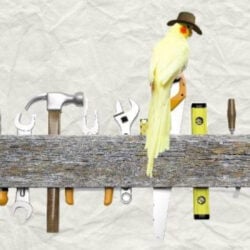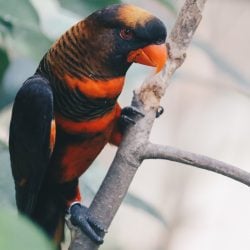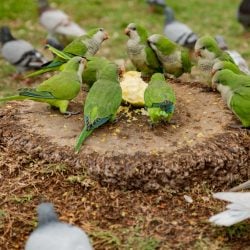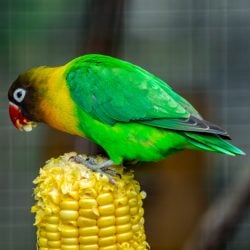Last Updated on by Mitch Rezman
Did you ever have that problem of trying to define what you did for a living to another human? I spend a lot of time triangulating information on the Internet in an attempt to fine-tune the accuracy of our Caged Bird Keepers knowledge base.
I read journals, blogs, forums and more emails than Tom Petty (maybe) – Did you know that Tom Petty has the second longest-running show on Sirius XM? Whoda thunk it?
Sometimes the extent of my ability to reach out to experts and execute query after query on Google, there still remain some questions that are above my pay grade.
A major challenge to the Caged Bird Keeper’s understanding of the effects of civilization and confinement of basically a wild animal. Captivity changes everything.
Sea World reminded us how Killer Whales got their name. Take an animal out of an ocean and put them in a bathtub and all bets are off.
Parrots are no different. We make our environment a couple of hundred square feet, in their home 10 square feet (if they are lucky). Thus it should be should be no surprise one may observe totally unexpected behavior in our birds.
I’m not embarrassed to say I don’t have all the answers. I’ll post my thoughts after the following question but I really like input from anyone reading this.
Question
About brooding activity: I have a strange story. I have two 7-yr-old male jenday/sun conures. They are definitely male. When their mother was still alive, they both regularly tried to mate with her, but were driven off by their father. Absent an available female, they have always had sex with each other regularly (taking turns with the “male” role), and both feed each other.
For several months they have been nesting on the top shelf of a kitchen cupboard. They use shredded can labels as their bedding. They sometimes spend hours there and strongly resist leaving their nest during the day, except when they are hungry or thirsty. When they are not in their nest, they socialize with us. They are happy to sleep in their cage at night, back to back, with one hanging off the side of the top of the cage.
They seem to be happy, so I don’t want to change their behavior, but I am curious if others have observed similar behavior.
end question
Personally, I’m not convinced that they are both males which cannot be determined conclusively without DNA sexing. I’m also sensing a little incestuous activity here with the whole jenday/sun conure thing. Jenday and Sun Conures are by all rights cousins or are our birds watching the news with us and slowly coming out?
Help me here please – because this issue needs resolution.
Moving along to what I call a “doozy” of a question. I’ll share my thoughts if you share yours.
Question
Because everything important and accurate that I’ve learned about being a bird mom came from you, I’d appreciate your opinion on what it means when my only-child parakeet, Rosie, reacts loudly when she hears bird calls from outside. Is she warning them off or begging for rescue?? I used to think that the excitement of this vocal interaction was good but now I’m not so sure. Also, just as a comment, it is a shame that your cagescape contest was not open to email entries because we would have SO won but I’m not on social media 🙂 Thank you for all the great info (and pictures) and products we get from you.
end question
She’s simply vocalizing and is happy to be making new feathered friends April.
Now if anyone wants to test this, play this song for your bird and wait and for the last 20 seconds of the song.
Or play all two minutes of this video.
Let us know how chatty your bird suddenly became 🙂
While on the subject of obscure bird behavior questions let’s listen to our contestant’s third and final round.
Hi Mitch,
I have an unusual question for you. I recently adopted an African Gray, she is 19 years old and came from a very dirty situation. She is very happy now. I can’t stand her name so I picked a name that is close. The person I got her from said if I change her name she will die because it would stress her. Told me this is a fault of the African Gray. Have you ever heard anything like this? Thank you for any information you can give me. Virginia
Look at the source (of the information:-) your grey just wants to be part of a loving social flock – sounds like you fit the beak, er’ bill.
In the wild birds have no names – just visual and vocal identification – start clicker training right away. Birds just love it once they realize they are getting a reward for good behavior, and are happy to perform well.
Hello,
You guys not only have the best products, but also great advice. Here’s a question…..We have a 25 year old, female Umbrella Cockatoo. I recently met a woman, who has a 12 year old male Moluccan. She said, “We should get them together for a play date”.
Neither bird has had contact with other cockatoos, although my bird does have a Maltese dog who she adores (and likewise). Both birds are sweet and friendly, but I have reservations, given the larger size of her bird and that he is a male.
Should we let them meet? and if so, how?
Thanks, Ling
end question
Supervised visits only. Ideally, they should start on a separate stand and you can have tea or coffee and observe. They should not be forced together or left in a room alone until you know if they will get along.
Let us know how it goes.
Catherine Tobsing
For our bonus round we ask:
The question really is one that researchers can never measure – do animals think it’s humorous or sad that humans have so much to learn?
written by mitch rezman
approved by catherine tobsing
Author Profile
Latest entries
 Bird BehaviorJune 26, 2025How is it Parrots Are Problem Solvers Social Animals and Even Use Tools?
Bird BehaviorJune 26, 2025How is it Parrots Are Problem Solvers Social Animals and Even Use Tools? Bird & Parrot AnatomyJune 25, 2025How a Tiny Chemical Modification Makes Parrots Nature’s Living Paintings
Bird & Parrot AnatomyJune 25, 2025How a Tiny Chemical Modification Makes Parrots Nature’s Living Paintings PigeonsJune 20, 2025How Do Parrots Thrive in Cities Outside Their Native Habitats?
PigeonsJune 20, 2025How Do Parrots Thrive in Cities Outside Their Native Habitats? Feeding Exotic BirdsJune 20, 2025Is Corn On the Cob Safe for Pet Birds?
Feeding Exotic BirdsJune 20, 2025Is Corn On the Cob Safe for Pet Birds?




